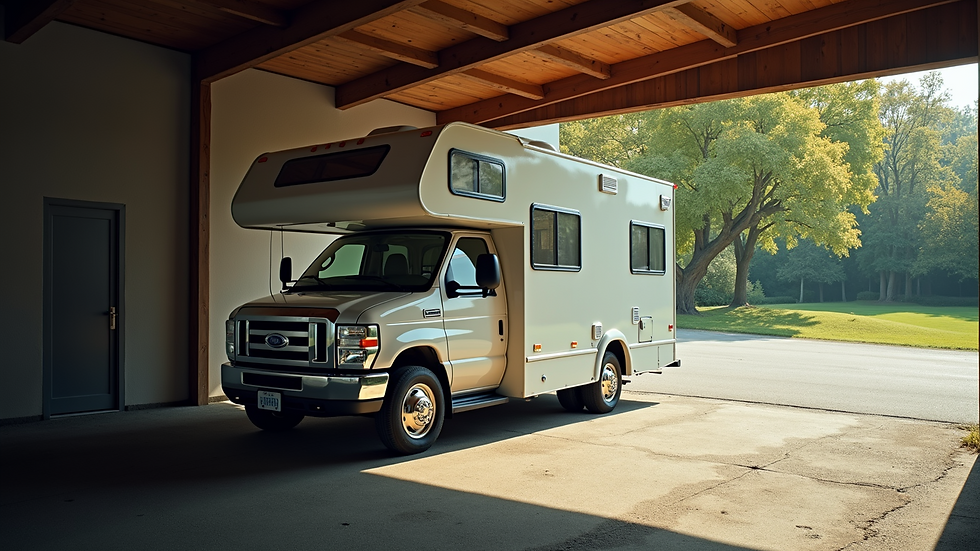Essential Tips to Prevent Water Damage in Your RV for Savvy Buyers
- Dave Kuiper
- Apr 26, 2025
- 4 min read
The open road invites adventure and freedom, especially for RV buyers keen on exploring new destinations. However, with the thrill of the journey comes the risk of water damage. Water leaks can result in expensive repairs, mold growth, and extensive damage to your RV's interior. Luckily, there are simple and effective steps you can take to protect your investment. Here are essential tips that every RV owner should follow.
Understand Common Sources of RV Water Damage
To keep your RV safe from water damage, it's important to identify potential sources. Some common culprits include:
Roof Leaks: Your RV roof can degrade over time, resulting in damaged seals and leaks. In fact, studies show that 40% of RV owners have experienced roof leaks at some point.
Windows and Doors: Poor sealing around openings can let water in during rainstorms. A recent survey indicated that 25% of RV water damage incidents occur through faulty window seals.
Plumbing Issues: Loose or damaged pipes can cause significant leaks if not promptly fixed.
Recognizing these risks allows you to take proactive measures against potential water damage.
Regularly Inspect the Roof
The roof is a vital part of your RV, but it is also one of the most susceptible areas to damage. Regular checks should focus on any signs of wear and tear, such as:
Cracks in sealant
Punctures or holes
Signs of rust or corrosion
Consider scheduling a professional roof inspection at least once a year. This small investment can save you hundreds, if not thousands, of dollars in repair costs.

Maintain Seals and Caulking
Seals and caulking around windows, doors, and vents act as your first line of defense against water intrusion.
Inspect Regularly: Check for any cracks or signs of deterioration at least twice a year.
Reapply Sealant: If you observe any damage, reapply a high-quality RV sealant to maintain a watertight barrier. Using a product like Dicor's Lap Sealant can be highly effective.
Keeping these seals well-maintained will significantly cut down the risk of water leaks.
Check and Maintain Plumbing Systems
Leaky plumbing can be a major source of water damage, so regular maintenance is essential.
Visual Inspection: Check hoses and fittings for signs of moisture or wear on a monthly basis.
Winterize Properly: If you're storing your RV during winter, ensure that you properly winterize your plumbing system to prevent freezing, which can lead to broken pipes. According to RV experts, about 20% of plumbing failures result from improper winterization.
By taking these simple steps, you can effectively reduce the risk of plumbing-related water damage.
Use a Dehumidifier
Keeping humidity in check inside your RV is crucial to preventing mold and mildew growth.
Invest in a Dehumidifier: A small, portable dehumidifier can help reduce excess moisture. It can be especially useful during rainy months or when your RV is closed for extended periods. Portable units can decrease humidity levels by up to 50%.
Ventilation: Always maintain proper airflow, especially in the kitchen and bathroom. Installing vents can promote better air circulation.
Applying these methods adds an extra layer of protection against long-term damage.
Ensure Proper Drainage
Pooling water around your RV site can lead to serious issues like undercarriage corrosion.
Check Gutters and Drains: Ensure that gutters and drains are free from debris. Clear gutters can direct rainwater away from your RV and prevent water buildup.
Positioning: When parking, aim to position your RV on a slight incline. This facilitates drainage and minimizes the chance of water pooling.
Implementing effective drainage practices will help keep your RV's surroundings dry and safe.
Be Mindful While Traveling
When you hit the road, gentle handling is key to maintaining your RV's water systems.
Check for Leaks: Before departing, ensure that all pipes and connections are secure to mitigate leaks that could occur during your travels.
Secure Water Connections: If connected to an external water source, ensure that connections are tight and suitable for travel to avoid disruptions.
Being vigilant while on the road can save you from headaches down the line.
Store It Right
Proper storage greatly influences your RV's resistance to water damage.
Indoor Storage: Whenever possible, store your RV in a garage or other covered structure to protect it from inclement weather.
Use RV Covers: If indoor options are limited, investing in a high-quality RV cover can protect your vehicle from rain, snow, and UV damage. Covers can reduce moisture exposure by up to 70%.
Smart storage practices not only guard against water entry but also help extend your RV's lifespan.
Final Thoughts
Preventing water damage in your RV requires vigilance, regular maintenance, and responsible storage methods. By being aware of common risks and implementing these practical tips, savvy RV buyers can protect their investments. Remember, a single day spent on maintenance can save you from thousands of dollars in repairs down the line. Prepare for your journeys with the peace of mind that you have taken essential steps to combat water damage risks.






Comments